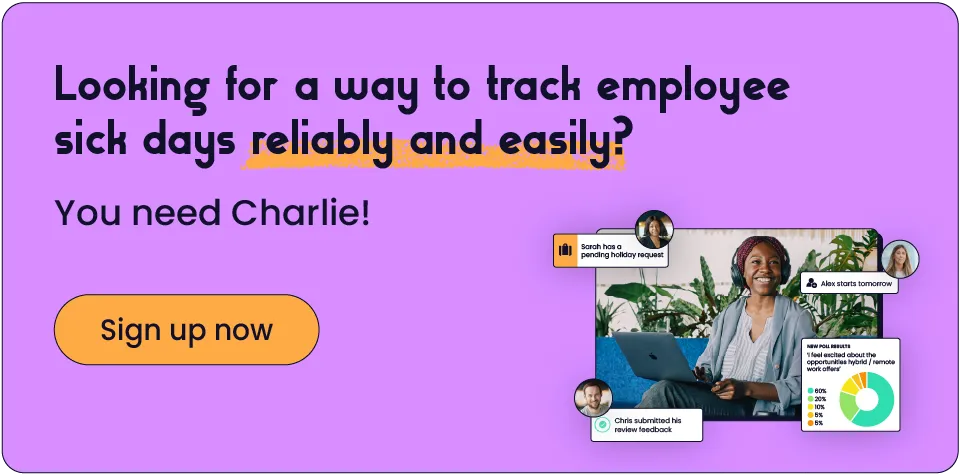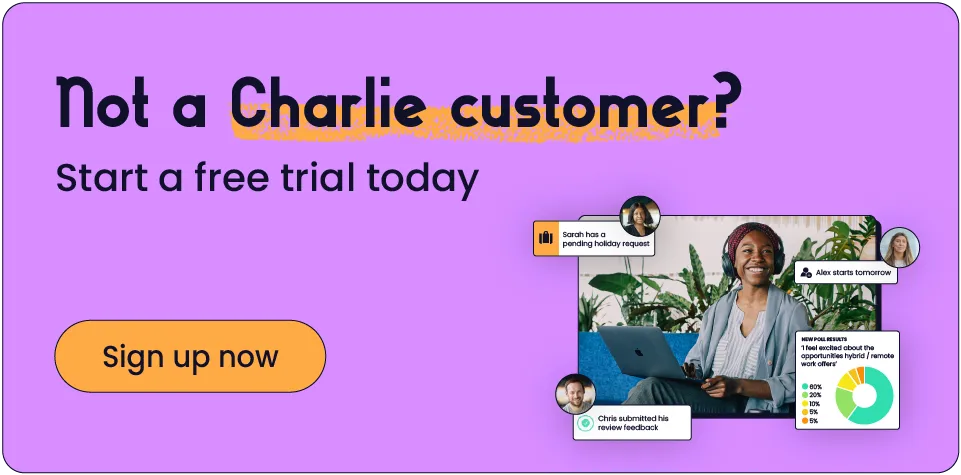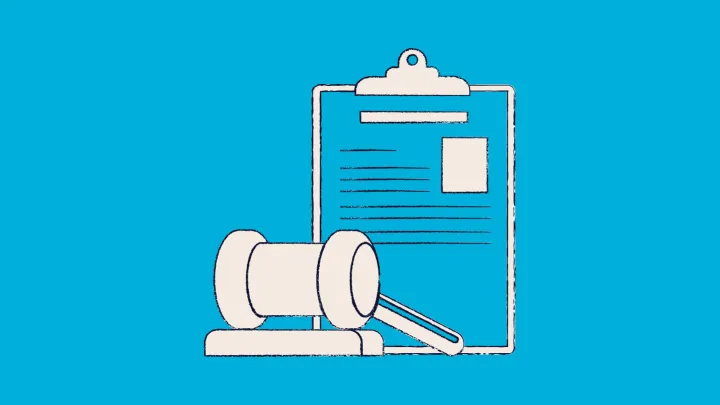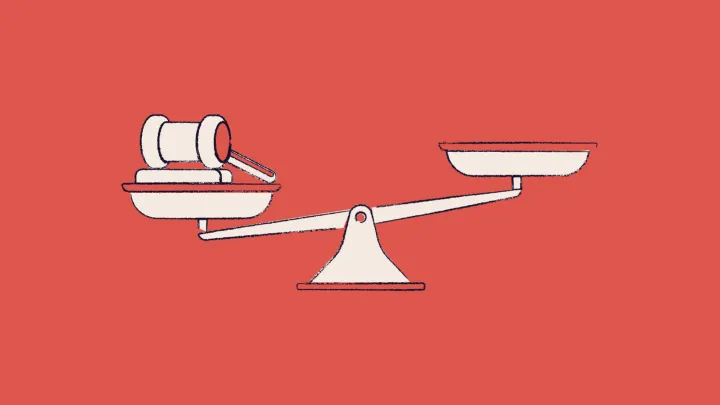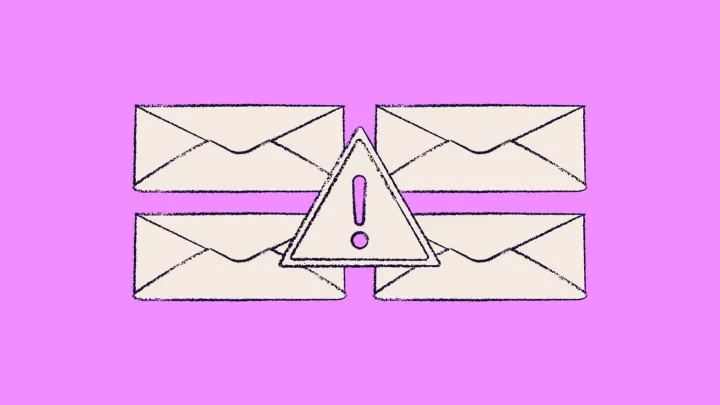How many sick days can someone take before getting a disciplinary?

As the owner or HR lead at a small business, you need to strike a balance between giving your employees enough time off work when they’re unwell (so they’re either not rushing back before they’re well enough, or not taking it at all), and safeguarding your organisation.
A disciplinary for sickness is not straightforward, but it may be necessary at times. Ideally, you want to spot patterns and do something about an employee’s recurring sickness before it warrants anything close to a disciplinary.
A disciplinary policy around sick days will help you open up a conversation if someone in your team is off work frequently or for extended periods. Your policy will also help to create a framework for those conversations, which is really important as you need to ensure you’re following fair procedure at all times.
How many sick days before disciplinary (UK)?
After this, if disciplinary remains your only option then following fair procedure will reduce the chance of a claim being made against you.
UK employment law doesn’t define how many sick days are ‘too many’, so the onus is on you as the employer to set a limit, whether that’s per month or per year, as well as the tipping point for disciplinary action.
You need to decide your sick day limit (how many sick days at full pay, half pay etc.), and what happens if it’s exceeded (or looks like it might be exceeded, as preventative action is always better than waiting until something becomes a problem).
If you do decide to move to a disciplinary then fair disciplinary procedures must be followed at all times, so you need to have this mapped out alongside your sick days policy.
Disciplinaries because of sickness are a grey area, and the reasons for absences are hugely varied, so it’s really important to have a policy around sick days for your business.
Can you get a disciplinary for being sick?
Nothing in UK employment law states how many sick days should result in a disciplinary, so it’s up to the employer to decide on the fair course of action.
An employee can ‘self-certify’ for seven days, but after that, they’ll need to provide evidence in the form of a doctor’s note.
As a small business, having a sickness policy in place will help you respond to concerns around recurring or prolonged absences fairly and reasonably — which may eventually include disciplinary action.
Can you get fired for calling in sick (UK)?
The quick answer to this question is no, you cannot fire someone for calling in sick to work.
However, if a member of your team is repeatedly off sick, or you spot recurring patterns in their sick leave, there are things you can do — including disciplinary action. You just need to make sure you follow fair procedure at all times.
Equally, if someone has a long-term illness that, despite adaptations and additional support, makes it effectively impossible for them to do their job, then you can move towards termination of employment. Again, you need to ensure you follow fair procedure at all times.
Gov.uk sets out the actions that all employers should take before heading down the disciplinary or dismissal route:
- You should look for ways to support your employees, including considering whether the job itself is making them sick and needs changing
- You should give them reasonable time to recover from their illness
- You should abide by your legal duty to support disability in the workplace (which may include long-term illness).
If you dismiss someone because of a disability and do not follow fair procedure, it can be ruled as unlawful discrimination.
If a disciplinary leads to an employee's dismissal, ensuring you’ve followed a full and fair process is vital. In an unfair dismissal claim, you want to be able to show that you were fair and reasonable, and took all the necessary steps to support your employee and keep them in work – also find out about written warnings before dismissal to understand more about the topic.
However
There are common barriers that especially affect small companies when it comes to sick days and disciplinaries:
- Concerns around legal compliance
Understanding and navigating the employment laws related to sick leave and disciplinary action can be complex. Small business owners and their HR teams can struggle to ensure that all of their actions comply with the regulations (and do not lead to legal consequences).
- Documentation challenges
Maintaining accurate records of all of your employees’ sick leave, including the reasons for their absences and any back-and-forth communication regarding their health, is crucial. However small businesses are likely to lack robust documentation systems, making it more challenging to justify disciplinary action based on a lack of attendance.
- Employee privacy
Enquiring about an employee's health and the reasons for them being off sick can raise privacy concerns. So managers must find a balance between addressing attendance problems and respecting someone’s right to privacy.
- Potential for legal claims
Disciplining an employee because of sick leave can carry legal risks, especially if someone has a valid reason for their absence — such as a protected health condition. There’s a very real fear that someone could claim unfair treatment or discrimination.
What should you say in your sick days policy?
With no legal ruling or even a recommendation on how many sick days are considered too many, as a small business how are you supposed to know what to write into your own policy?
Remember: there’s no easy answer when it comes to how many sick days before disciplinary. As the employer, you need to ensure you’ve given enough time for recovery and offered to make reasonable adjustments so your employee can comfortably return to work.
It’s a pretty tough call to make on your own, especially if you have no previous experience in determining sick day limits or deciding on disciplinary action.
As a fellow small business, we understand this.
Sharing our knowledge and experience with others is at the core of what we do at Charlie, so we thought we’d share our own sick and personal days policy here for you — which you are very welcome to copy or emulate.
Our approach to sick leave is that we have a specific number of fully paid sick days for each employee per year, and if someone exceeds that threshold then their pay is reduced (and reduced again if they exceed the next one).
is that we have a specific number of fully paid sick days for each employee per year, and if someone exceeds that threshold then their pay is reduced (and reduced again if they exceed the next one).
We don’t mention disciplinary action in any way in our policy, but we do introduce the idea of having a conversation if someone’s sick days become frequent or extended:
“If you’re not feeling well please book off a sick day in Charlie. We’d prefer you to take time at home to focus on feeling better than come in! If these become frequent, or if you need an extended period of time off, your line manager will have a conversation with you to check how we can support you best during this time.”
Setting out expectations like this will make it easier for you to open up a difficult conversation with someone in your team.
You want to make it clear that you care about your team’s wellbeing first and foremost (rather than coming across as a suspicious employer). A conversation around sick days is about offering support, not about telling someone off.
Behind our policy is a clear understanding of what we do at Charlie if someone exceeds their sick day allowance, and we’ve given all our managers training around this.
We’re also very upfront with our employees, and they know that their managers will be notified if they take more than two days off a month. This is so our managers can use their training to spot potential problems and better support their line reports, not to stop people from taking more than two days of sick leave in a month.
How Charlie can help with your sick days policy
At Charlie, we help small businesses by sharing our knowledge, providing expert HR advice, and through our HR software.
Our software is particularly effective for tracking and managing your employees’ sick leave.
With Charlie, you can easily track all types of employee leave, including their sick days:
- Members of your team record their sick days in just one click, straight from their CharlieHR dashboard
- Their manager then receives an immediate notification
- The sick day is registered in Charlie and managers can see at any time how many sick days their direct reports have taken in the current leave year, or over past years
- The system differentiates from non-deductible sick days and deductible annual leave, automatically managing all the pro-rata calculations for you.
Charlie also integrates with Slack, so you can set it up so that it automatically updates when someone is off sick.
With our reports function, Charlie allows you to monitor and evaluate:
- Time off taken
- Holiday taken
- Sick days taken
- Average sick days per person.
Charlie’s your one-stop-shop for recording, tracking and reporting on every type of employee leave. If someone in your team is frequently off sick, you can access a record of it in just one click — saving you time and faff, and giving you a reason to have a conversation with your employee.
